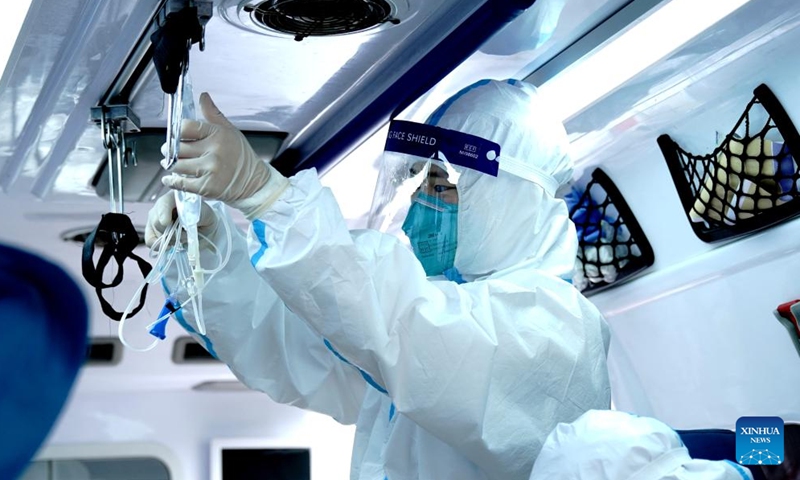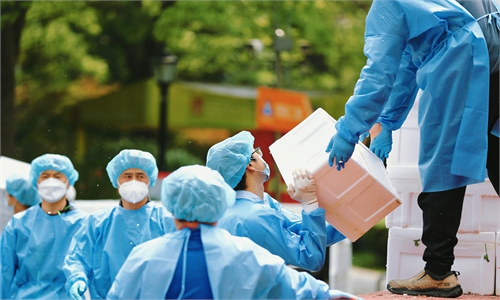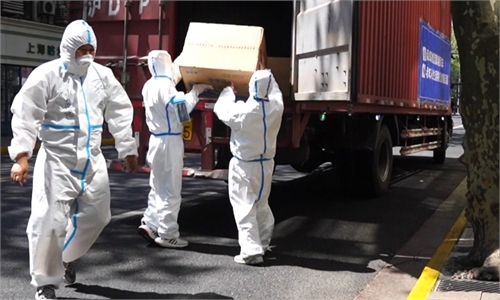Shanghai makes initial progress in combating Omicron, facing challenges in treating severe cases: senior expert

A medical worker prepares to put a patient on a drip in an ambulance from the medical emergency center of Minhang District of Shanghai in Shanghai, East China, April 23, 2022. Photo:Xinhua
Although Shanghai has made initial progress in fighting the latest Omicron outbreak with a declining number of infections found in communities, the city is still facing the biggest challenge in treating severe COVID-19 patients as 51 more deaths were recorded on Sunday, lifting the total in this round of the outbreak to 138.
The 51 patients had an average age of 84.2, including 37 aged above 80, and the oldest being 100. These patients had severe underlying diseases such as acute coronary syndrome and heart failure, Zhao Dandan, a deputy director of Shanghai's health commission, said at Monday's press briefing.
"Direct causes of the deaths were underlying diseases," Zhao said.
Only four had been vaccinated. Among the 24,102 patients hospitalized, there were 196 severe cases and 23 critical ones, according to the authorities.
Since the resurgence of Omicron, there have been significant differences from the outbreak in Wuhan, Central China's Hubei Province, two years ago, when the fatality rate peaked at more than 5 percent, Zhang Wenhong, head of the Shanghai COVID-19 medical treatment expert team, said during an interview with the People's Daily on Sunday.
The fatality rate in Shanghai remained at 0.0178 percent (87/488,000), and the deaths of elderly patients and patients with underlying diseases represent the biggest challenge Shanghai faces, Zhang said.
Due to the characteristics of elderly patients with multiple and severe underlying diseases, there are high requirements for treatment, according to Zhang. Over 360 medical experts treating severe cases in Shanghai, along with experts from other regions, have jointly set up nine treatment teams for severe cases, who have been dispatched to eight designated hospitals, Zhang said.
Zhang stressed that it would be a long-term battle against Omicron, and the goal is to prevent elderly people and vulnerable groups from risk.
He said that despite facing the resurgence risk, it's good to know that the number of positive cases detected among communities has declined. The megacity of 25 million on Sunday registered 2,472 locally transmitted COVID-19 cases and 16,983 local asymptomatic infections.
Among the total, 1,557 confirmed cases and 16,835 asymptomatic cases were detected under the closed-loop mechanism, the Shanghai health authorities said on Monday.
According to Zhang, Shanghai has seen a gradual decline from a daily high of 27,000 infections since early April to around 20,000. The effective reproduction number of virus transmission now is around Rt=1.0, decreasing from R0=9.5.
Zhang noted that the once hard-hit Pudong district took the lead in reducing the Rt value to below 1.
According to media reports, the R0 is the initial reproduction number of the virus at the beginning of the pandemic, while Rt refers to the reproduction number at a particular point in time. An Rt of less than 1.0 means the infection is decreasing, media said.
Most of the cases reported in Shanghai and Northeast China's Jilin Province were caused by underlying diseases, unlike the deaths reported in Wuhan two years ago of people who were in "severe respiratory distress."
Zhang explained that the COVID-19 patients who died and also had severe underlying diseases, and who had been treated in designated hospitals, will be counted in the number of COVID-19 related deaths even if their COVID-19 symptoms were not serious.
A Beijing-based immunologist told the Global Times on condition of anonymity on Monday that reduced herd immunity could be another possible reason for the growing number of COVID-19 related deaths.
For those with underlying diseases and elderly people, whose herd immunity would be reduced due to many reasons such as depression, the number is likely to increase without effective intervention measures, the immunologist said.
Zhang suggested establishing a scientific treatment mechanism to minimize the harm brought by Omicron. For instance, designated COVID-19 hospitals will not only treat COVID-19 patients, but also those with severe underlying medical diseases. Zhang also called for raising vaccination rates among people who didn't get shots due to concerns over the side effects of vaccines.
In another development, the Shanghai New International Expo Centre makeshift hospital, with 15,000 beds, has updated its facilities by adding eight emergency treatment rooms.


